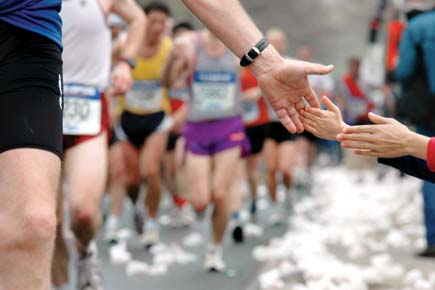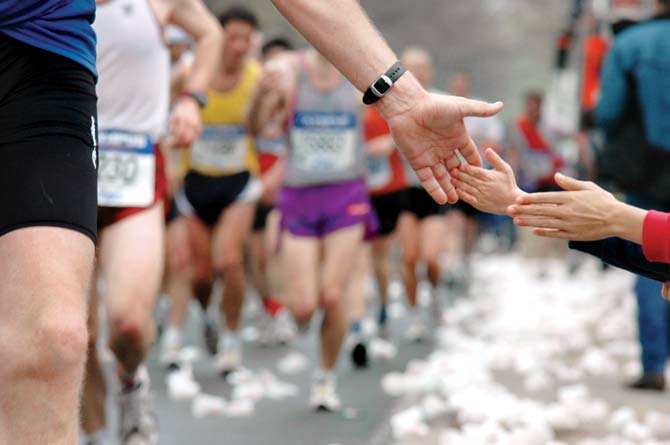Happy faces can help you push yourself for longer. Sports journalist Amit Katwala shares many tricks for better performance in his latest book. The Athletic Brain. Excerpts:

The brain, for all its wondrous abilities, is very easy to trick. We see it all the time with the placebo effect — doctors prescribing sugar pills or performing sham surgeries have found real health benefits. Studies have revealed that just rinsing your mouth out with a drink containing carbohydrates can improve your performance and reduce your perception of effort. Sometimes, having less information, or the wrong information, can actually be better, especially when it comes to endurance.

ADVERTISEMENT
This kind of deception can help people to eke out improvements over and above what they thought were their limits. It's basically what Simon Wheatcroft did in his first 100-mile race — he found the strength to override his brain and get more from his muscles.
Professor Kevin Thompson at Northumbria University asked cyclists on exercise bikes to try to keep up with a computer rider on a screen in front of them until the finishing line. They were told that the virtual rider's speed was determined by one of their own personal bests, so the rider would be travelling at a speed they knew they could manage.
In fact, the virtual rider was going faster than the personal best — up to 5 per cent faster — yet all the cyclists were able to keep up with it, thus improving their own personal bests. 'These findings demonstrate a metabolic reserve exists which, if it can be accessed, can release a performance improvement of between 2 and 5 per cent in terms of their average power output,' said Thompson. 'We believe a small deception of the brain can enhance performance. Despite the internal feedback to the brain being heightened by the extra power output being produced, the participants still believed it was possible to beat their opponent.'
The problem with placebo-style deceptions like these is that if the athlete knows about them, they don't really work. So Marcora and others are working on ways to reduce perception of effort that tap into our subconscious mind. The light, wraparound sunglasses favoured by some athletes already feature some pretty advanced technology.
In future, they could hold the key to endurance-racing success, or find themselves on the banned items list alongside the full-body swimsuits which helped shatter records in the swimming pool. Products such as Google Glass — a heads-up display that is worn as a pair of glasses — can provide information on the go, and a company called Recon make a sturdier version designed for sport. They can flash up information about distance travelled, pace and heart rate like a sports watch, without forcing the runner to take their eyes off what is in front of them.
Marcora has been working with Recon to develop a product that takes advantage of a phenomenon he and his former colleagues at Bangor University in Wales discovered in the lab. They paid 13 volunteers to pedal an exercise bike at a set pace for as long as possible - a common test of physical endurance. But, unbeknown to the cyclists, a screen in front of them was flashing up subliminal messages — for just 16 milliseconds at a time, one-twentieth of a blink. Cyclists who were flashed sad faces rode 22 minutes and 22 seconds on average, but those who were shown happy faces reported less perceived exertion and rode for three minutes longer. 'The brain is very sensitive to faces,' says Marcora when he tells me about this.
'They can really change your brain activity and your mood, so when people are flashed the subliminal happy faces they perceive less effort and they last longer.' Your own facial expression is a good way of measuring perception of effort, so Marcora is also trying to find out whether changing your expression - by smiling while running, for example — can improve your endurance. He has found the same performance boost with subliminal presentation of words: cyclists flashed action words such as 'Go' or 'Lively' lasted 17 per cent longer than those flashed inaction words such as 'Toil' or 'Sleep'.
You might think that flashing the images up for longer would have more of an effect, but you'd be wrong. 'Some of the stimuli actually work better when they are subliminal than when they are conscious,' says Marcora. 'It's a different kind of brain. They were not conscious of the stimuli, but the unconscious stimuli had a conscious effect because they felt lower perception of effort when they were flashed the faces, even though they didn't see them.'
Excerpted with permission from The Athletic Brain: How Neuroscience Is Revolutionising Sport and Can Help you Perform Better By Amit Katwala, published by Simon and Schuster
 Subscribe today by clicking the link and stay updated with the latest news!" Click here!
Subscribe today by clicking the link and stay updated with the latest news!" Click here!







